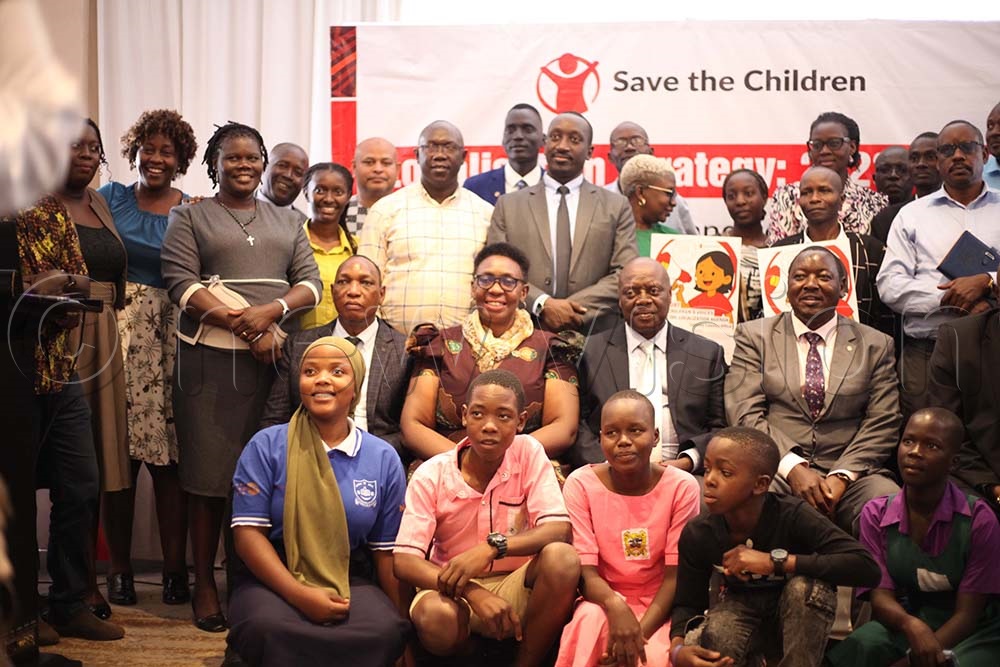Children want inclusion in strategies affecting them
Lakot Mercy Oryema, a pupil from Pogo Okuture Primary School in Amuru district, said, “Many children from poor families are being left behind. Some walk for hours just to attend school, and sometimes they arrive there hungry or late. We need the government and organisations to really listen to us.”
A young girl from Karamoja talks about the challenges children face in the Karamoja region. (Credit: John Musenze)
By John Musenze
Journalists @New Vision
Children have urged policymakers to actively include them in the development and implementation of strategies affecting their lives, particularly in education and welfare.
Their appeal came during the launch of Save the Children’s Localisation Strategy 2023–2027, on May 13 at the Golden Tulip in Kampala.
Speaking during a panel discussion, children highlighted pressing issues often overlooked in policymaking. Among their concerns were long treks to school, lack of school meals, unaffordable school fees, and persistent ignorance among parents—especially regarding the education of girls.
Lakot Mercy Oryema, a pupil from Pogo Okuture Primary School in Amuru district, said, “Many children from poor families are being left behind. Some walk for hours just to attend school, and sometimes they arrive there hungry or late. We need the government and organisations to really listen to us.”
The event, which brought together government officials, UN agencies, humanitarian partners and refugee-led organisations, showcased the voices of children and communities as central to effective humanitarian response.
A panel of children tabled demands as they asked for inclusion in policies meant to better their welfare. (Credit: John Musenze)
Save the Children’s country director Famari Barro reiterated this vision, explaining that the strategy aims to place power in the hands of those closest to the problems.
“Local actors know best what their communities need. Our strategy is designed to let them lead—from identifying issues to monitoring implementation,” she said.
However, he acknowledged funding remains a major challenge.
“We aim to allocate at least 30% of our funding to local partners, but we haven’t yet reached that goal. On top of that, we recently lost two US government-funded projects due to executive decisions, which forced us to lay off some staff,” he revealed.
Despite these setbacks, he remained hopeful.
“We are focusing on diversifying our sources of funding and strengthening local partnerships. We are also working closely with the government to ensure sustainability,” he said.
When asked how the Government could support the strategy, he emphasised collaboration.
“We consult at all levels—national, district, and community. We involve women, youth, people with disabilities and the elderly to make sure no voice is left out.”
He also spoke about Save the Children’s recent work in education, saying:
“Through our partnerships, we’ve constructed schools, trained teachers, provided supplies and supported school governance. But most importantly, we’ve worked to involve parents and communities in managing school affairs.”

Participants after the launch of the new strategy. (Credit: John Musenze)
Calling for a cultural shift in communities, he urged, “Organisation is the basis of development. When communities organise themselves—through clean environments, school feeding groups or village associations—donors, even those abroad, are more likely to support them.”
Solomon Sonko from the Office of the Prime Minister acknowledged the children’s input, praising their courage in raising real issues.
“The work being delivered by children today is a direct result of our collective efforts in the National Localisation Task Force,” he said. “We must ensure that all strategies reflect the real needs of children—both refugees and host communities.”
Sonko went on to emphasise that localisation is not about excluding international partners but redefining roles to empower local actors.
“Localisation is about trust, equitable partnerships and building the capacity of local responders so they can act confidently, even when international agencies withdraw,” he noted.
He lauded Save the Children for the work they are doing in Uganda and reaffirmed the government’s willingness to continue working with them, especially in this new strategy.
Uganda continues to champion localisation in the refugee and humanitarian sector, and the voices of its youngest citizens may well be the compass guiding it towards a more inclusive and effective future.

Comments